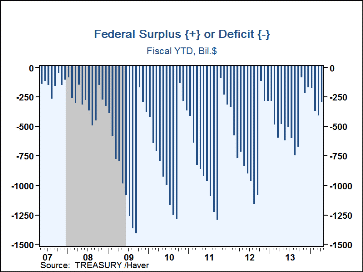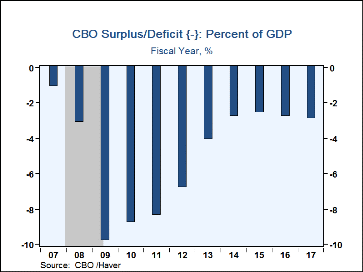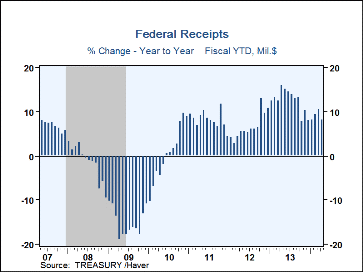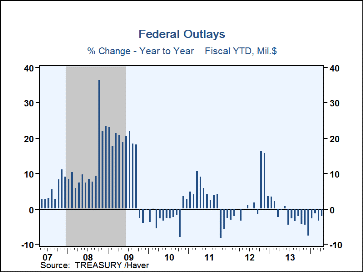 Global| May 12 2014
Global| May 12 2014U.S. Budget Moves Into the Black for April
by:Tom Moeller
|in:Economy in Brief
Summary
The Federal Government posted a $106.9 billion budget surplus during April of FY 2014. The latest figure compared to expectations for a $114.0 surplus in the Action Economics Forecast Survey. In the first seven months of this fiscal [...]
The Federal Government posted a $106.9 billion budget surplus during April of FY 2014. The latest figure compared to expectations for a $114.0 surplus in the Action Economics Forecast Survey. In the first seven months of this fiscal year, the deficit totaled $306.4 billion compared to $487.6 billion last year. It was the smallest budget deficit during the first seven months of any fiscal year since 2008.
The April filing deadline for individual income tax returns boosted revenues by nearly one-third m/m, thus generating the monthly budget surplus. For the fiscal year-to-date, overall net revenues increased 8.2% y/y with the stronger economy. Corporate income taxes increased 15.0% y/y while the improved labor market raised social insurance taxes by 12.1% y/y. Individual income taxes increased a lesser 3.5% y/y and excise taxes were roughly unchanged y/y.
The smaller budget deficit in FY'14 also reflects a 2.4% y/y decline in net outlays versus last year. Outlays were led lower by a 5.2% y/y reduction in defense outlays, a 3.9% y/y falloff in interest payments and a 3.5% decline in income security payments with the lower unemployment rate. Working the other way, veterans benefits programs payments increased 10.7% y/y, health program outlays increased 9.8% y/y and social security payments rose a steady 4.7% y/y. Medicare outlays nudged 0.6% higher so far this fiscal year versus last.
Haver's basic data on Federal Government outlays and receipts, and summary presentations of the Budget from both OMB and CBO are contained in USECON. Considerable detail is given in the separate GOVFIN database.
The Global Economy, the U.S. Economy, and the Federal Reserve's Monetary Policy from the Federal Reserve Bank of Atlanta is available here.
| US Government Finance | Apr | FY'13 | FY'12 | FY'11 | FY'10 | |
|---|---|---|---|---|---|---|
| Budget Balance | -- | $106.853 bil. | $-680.3 bil. | $-1,089.2 bil. | $-1,296.8 bil. | $-1,294.2 bil. |
| As a percent of GDP | -- | -- | 4.1 | 6.8 | 8.4 | 8.8 |
| % of Total | YTD FY'14 | |||||
| Net Revenues (Y/Y % Change) | 100 | 8.2% | 13.3% | 6.4% | 6.5% | 2.7% |
| Individual Income Taxes | 47 | 3.5 | 16.3 | 3.7 | 21.5 | -1.8 |
| Corporate Income Taxes | 10 | 15.0 | 12.9 | 33.8 | -5.4 | 38.5 |
| Social Insurance Taxes | 34 | 12.1 | 12.1 | 3.2 | -5.3 | -2.9 |
| Excise Taxes | 3 | 0.2 | 6.3 | 9.2 | 8.2 | 7.1 |
| Net Outlays (Y/Y % Change) | 100 | -2.4 | -2.4 | -1.7 | 4.1 | -1.8 |
| National Defense | 18 | -5.2 | -6.3 | -3.9 | 1.7 | 4.6 |
| Health | 10 | 9.8 | 3.1 | -7.0 | 1.0 | 10.4 |
| Medicare | 14 | 0.6 | 5.5 | -2.8 | 7.5 | 5.0 |
| Income Security | 16 | -3.5 | -1.1 | -9.1 | -4.1 | 16.7 |
| Social Security | 24 | 4.7 | 5.2 | 5.8 | 3.4 | 3.5 |
| Veterans Benefits | 4 | 10.7 | 11.5 | -2.0 | 17.3 | 13.6 |
| Interest | 6 | -3.9 | 0.4 | -3.0 | 15.8 | 2.9 |
Tom Moeller
AuthorMore in Author Profile »Prior to joining Haver Analytics in 2000, Mr. Moeller worked as the Economist at Chancellor Capital Management from 1985 to 1999. There, he developed comprehensive economic forecasts and interpreted economic data for equity and fixed income portfolio managers. Also at Chancellor, Mr. Moeller worked as an equity analyst and was responsible for researching and rating companies in the economically sensitive automobile and housing industries for investment in Chancellor’s equity portfolio. Prior to joining Chancellor, Mr. Moeller was an Economist at Citibank from 1979 to 1984. He also analyzed pricing behavior in the metals industry for the Council on Wage and Price Stability in Washington, D.C. In 1999, Mr. Moeller received the award for most accurate forecast from the Forecasters' Club of New York. From 1990 to 1992 he was President of the New York Association for Business Economists. Mr. Moeller earned an M.B.A. in Finance from Fordham University, where he graduated in 1987. He holds a Bachelor of Arts in Economics from George Washington University.










